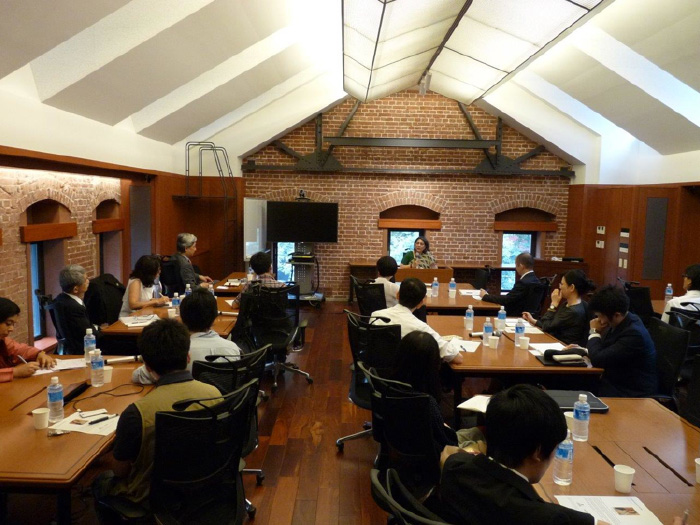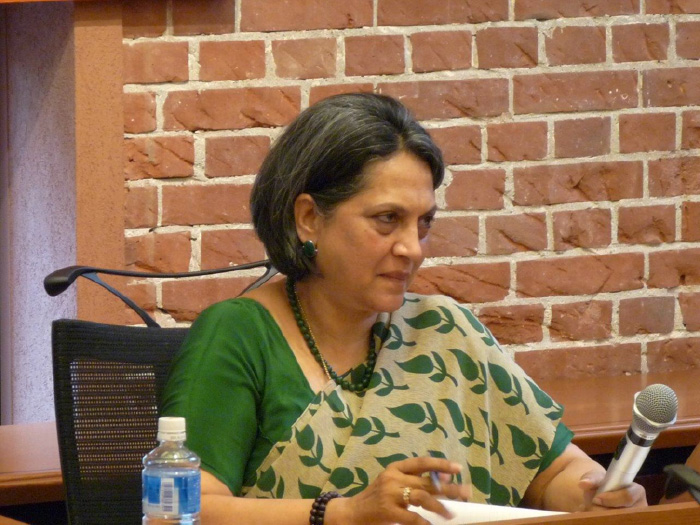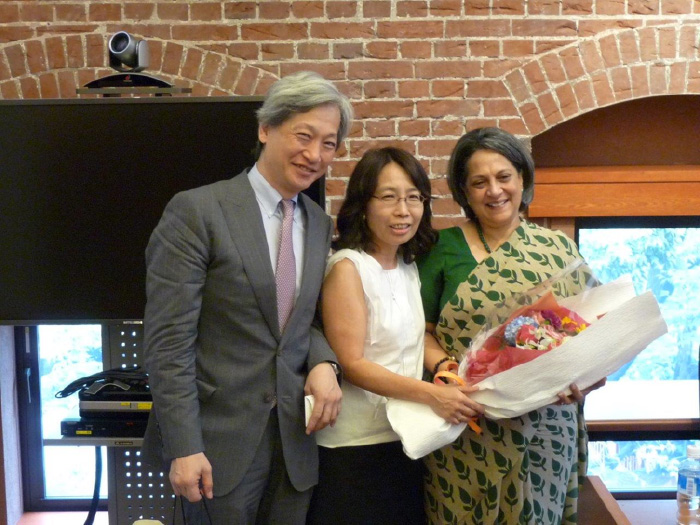SSU Forum with Smt. Deepa Gopalan Wadhwa
| Date: | Tuesday, June 24, 2014, 10:30-12:00 |
|---|---|
| Venue: | Conference Room, 3rd Floor, Ito International Research Center |
| Subject: | “The World According to India” |
| Lecture: | Her Excellency Smt. Deepa Gopalan Wadhwa, Ambassador of India to Japan |
| Language: | English |
| Hosted by: | Security Studies Unit, Policy Alternatives Research Institute, the University of Tokyo |
The Security Studies Unit of the Policy Alternatives Research Institute was delighted to host Her Excellency Mrs. Deepa Gopalan Wadhwa as guest speaker within the framework of the SSU Forum on June 24, 2014. The Ambassador delivered a talk bearing the title “The World According to India”.
SSU Director Professor Kiichi Fujiwara chaired the session. He introduced the Ambassador to the distinguished audience by recalling her outstanding career record with the Indian Foreign Service, where she served also at India’s diplomatic mission to China in two periods (1983-1987 and 1992-1994). She has also worked for the International Labour Organisation (ILO), along with doing postings in Hong Kong, Geneva, and The Hague. Before being appointed to as Ambassador of India to Japan, she was Ambassador of India to Sweden & Latvia, and to Qatar (March 2009 June 2012).
Professor Fujiwara described the Ambassador as one of the most articulate diplomats currently working in Tokyo, and pointed at the many links between India in Japan, from those connecting the two nations in history and common origins of religious beliefs, to the growing business relations.
Her Excellency Ambassador Mrs. Wadhwa thanked the host for the kind introduction and for the opportunity to speak at the SSU Forum. Reflecting on her diplomatic career, she expressed the view that representing India is for her the greatest honour, a feeling which pervades every Indian working for the Foreign Service.

Explaining the rationale of her talk, the Ambassador expressed her intention to refrain from well-established clichs about India’s foreign policy, deciding instead to articulate a more systemic narrative of how India sees the world. The starting point concerns the question: what does India want from its engagement with the world? India’s foreign policy can be viewed as striving towards these main goals:
- Economic prosperity: India is expected to be the country with the largest population by 2030, surpassing China. There are still several hundred million Indians living below the poverty line, and the priority for any government, therefore, has been to fight poverty and improve standards of living. This also means that essentially every policy of the country, including foreign relations, has to focus on poverty alleviation and the promotion of economic prosperity as one of its principle objectives.
- Peace: India is not only committed to the defence of its territorial integrity, but given its sheer geographic and demographic dimension, and considering the network of relations linking it to its neighbourhood, it also wishes for a peaceful periphery. More broadly, India embraces a concept of peace which is not only centered on the traditional military conflict in a classical sense, but in tackling challenges such as terrorism, cybersecurity, and new threats such as environmental and epidemiological disasters.
- An Equitable World Order: This has been a feature of India’s foreign policy from the start and is reflected in the positions taken in international fora and membership of groupings such as the G-77.
The guiding principle of Indian foreign policy has been strategic autonomy. This means, while India is ready to cooperate in partnership schemes with other nations, it intends to determine its course of action based on independent judgment and based on its national interests, without external influence, whether ideological or of other nature.
The next set of factors which the Ambassador highlighted in order to illustrate India’s international political position include a reflection on the role played by geography and history. The country’s proximity to several important macro-regions of the globe (East Asia, West Asia/Middle East, South East Asia) implies that India necessarily has stakes in cultivating good relations with nations in such regions. Historically, the complex stratification of empires and outside influence have all contributed to the creation of modern India, and established connections ties with other areas, such as Europe, the Muslim world, but also Africa, the Caribbean, and Oceania. The presence of Indian communities, or of people of Indian origin, in many corners of the world, reveals how India is profoundly related to numerous, sometimes unexpected, regions of the planet.
A final factor shaping India’s foreign policy is globalisation, the growing interconnectedness in economic and political terms, among all states and societies of the world. Many commentators have pointed out that India successfully rode out the wave of globalisation, which happened at a time when Delhi was reforming its economy in the direction of market liberalisation. The country managed to sustain high rates of economic growth for a long period, and to establish an international competitive advantage in several sectors, particularly in the IT industry. However, this very process of globalisation and growing interconnectedness also means that India’s economic interests are now significantly more dependent on externalities than before, and they need to be monitored and protected with a significantly larger effort. An example is the energy sector, where rapidly expanding demand caused by economic development has to be met with increasing imports of energy commodities from other areas of the world, thus generating an unprecedented degree of interdependence.
India also seeks to engage other nations in the context of a multipolar world. Engagement means the creation of partnerships, but not of formal alliances, as India, arguably because of its history, does not intend to be committed to rigid structures constraining its strategic autonomy. India also sees international institutions and organisations playing an important role in the contemporary world.

After analysing the various key objectives, principles and factors underpinning India’s foreign policy, the Ambassador moved to a broad-stroke picture of the country’s relations with each region of the globe.
Staring from South Asia, where elections have been held recently in most countries, Indian efforts continue to engage with its neighbours. There is the belief that greater economic integration would help to build a stronger South Asia. In this context she specifically mentioned Prime Minister Modi’s initiative to invite all heads of governments of SAARC countries to his swearing in on May 26, 2014.
China represents certainly one of the key partnerships from Delhi’s perspective. China and India have millennia-old history of peaceful engagement and mutually profitable exchanges. Only in the last sixty years have the two countries experienced some degree of conflict due to principally the undemarcated border. However, Ambassador Wadhwa expressed the view that the world is large enough to accommodate the peaceful rise of both China and India. In many areas, the two nations are closely cooperating, sharing common views about the necessity for a sounder global governance system, and in issues such as climate change.
Japan is increasingly emerging as the best bilateral partner for India among major powers. Japan and India’s political interests and principles possess numerous areas of overlap, leading to shared concerns for the preservation of global peace and the promotion of prosperity and stability worldwide. The Ambassador expressed the view that such a positive relationship can have an impact going far beyond Asia.
Korea is an active economic partner, whose importance for India has been steadily growing in the last few decades, with a dramatic acceleration in recent years due to Seoul’s acquired status of economic and technological power. India is also closely following, sharing concern with other Asian nations, the situation in the DPRK.
South East Asia is an area where India is greatly expanding its presence and diplomatic activity, both in terms of boosting bilateral ties, and in its relation to ASEAN. This follows from its Look East policy of 1992. Myanmar represents a particularly important neighbour with which India shares a 1400 km border and which borders 4 Indian states.
West Asia is a region with six to seven million Indian workers who contribute to not only the economies of their host countries but also India, thanks to the flow of remittances they generate. Trade with this area is also flourishing. As a large share of India’s energy commodity imports originate from the Gulf, the region has assumed strategic importance. India has good relations with both Saudi Arabia and Iran, and it has been able to establish diplomatic dialogue and cooperation with all kinds of regimes in the region.
India has close relations with the central Asian countries in the light of historical and growing economic and energy ties.
Africa is a continent where a number of countries have deep ties to India, primarily as a consequence of the historical legacy of the British Empire. This also means that a large population of people with roots in India currently live in a number of African nations. On the other hand, India has traditionally been working with Africa since the 1950s on technical cooperation programmes aimed at capacity building. But besides history, many connections have been recently developed especially in terms of trade and investment. After the US and the EU, India, and not China, is the third largest investor in the continent in terms of private sector investments.
India’s relations with the EU are not only characterised by cultural and political ties created at the time of European colonial presence in Asia, but also are anchored in a common belief in democracy and human rights, and the historical connect whereby Indian servicemen fought bravely in both WWI and WWII in Europe - their sacrifices seldom receiving the acknowledgement it deserves.
Russia has always represented a very important partner for India. The USSR and the Russian Federation as its successor state have a long record of diplomatic, military, and economic cooperation with Delhi, sometimes playing a crucial role during international crises, such as during the liberation of Bangladesh and taking a principled stand on the Kashmir. India has regular annual PM level summits with only two major powers: Japan and Russia.
The US is an indispensable partner in the current world order. There are many elements in common between the US and India the two are the world’s largest democracies - and there are many areas of convergence spanning political, strategic, economic and technology fields.
Finally, there is a growing trend in India’s cooperation, mostly bilateral, with Latin America especially Brazil, Mexico and Chile. Brazil is an important partner with common interests and aspirations as rapidly industrialising developing countries, ranging from climate change to the eradication of poverty.
India has always been a strong supporter of the UN. However, India feels that many of today’s institutions for global governance including the World Bank and the IMF are anachronistic and reflect the post-WWII era when they were created. It is therefore necessary to reform such institutions to reflect contemporary reality. This is certainly the case of the UN Security Council, where India along with Japan, Brazil and Germany cooperate as the G-4 and believe that they should become permanent members.
In conclusion, Ambassador Wadhwa expressed the view that India, though being termed as emerging power, does not see its “power” as a manifestation solely of material strength and capability, but ascribe to the importance of the “power of ideas” and the “power of values”, which India would like to embody by the force of example.

-
Ambassador of India to Japan
